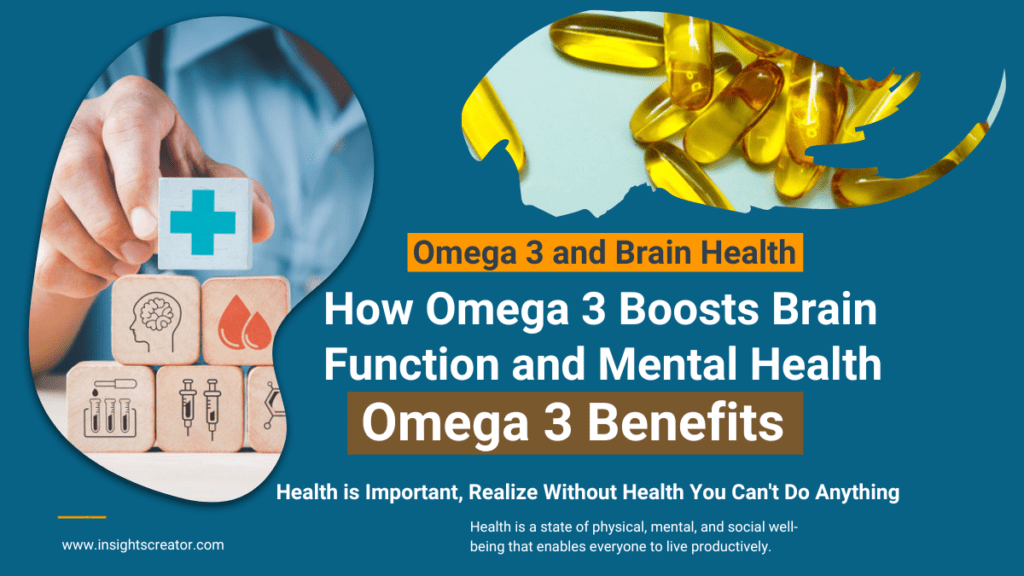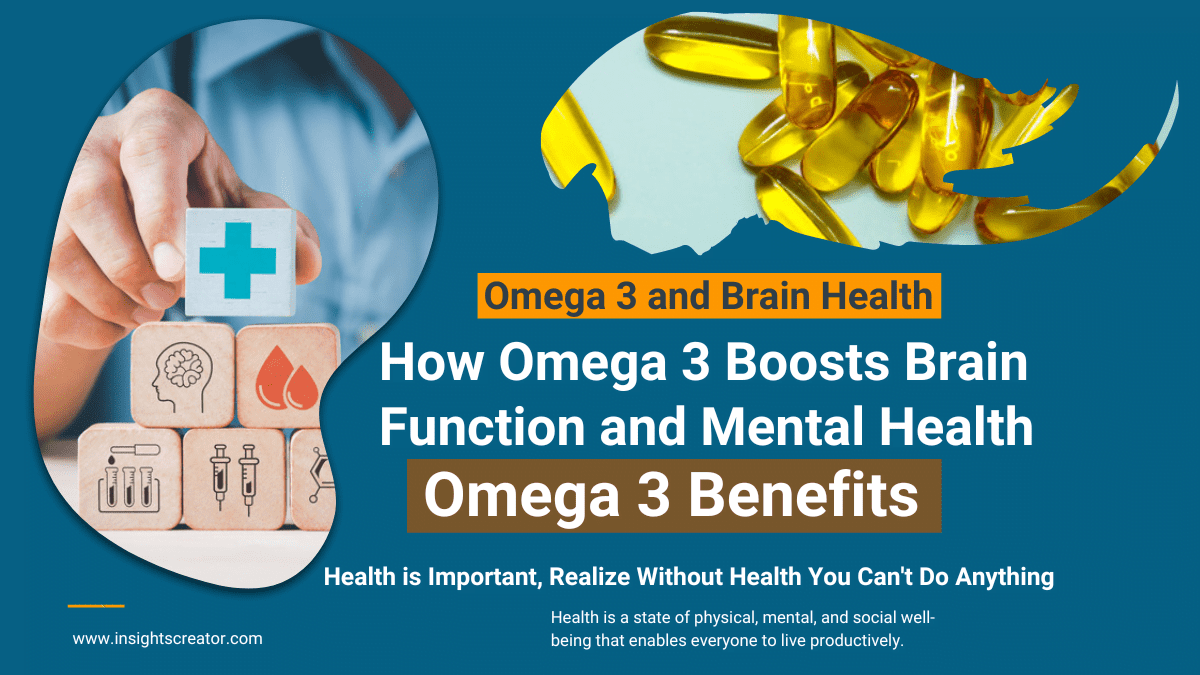Contents
I. Introduction
You probably know Omega 3 as the ‘good fatty acid’ that your mom nagged you to include in your diet, right? But did you know this nutrient holds the reins of your brain function and mental health as well? Yup, straight out from the horse’s mouth! Omega 3 benefits for women , Children and Men also.

A. Brief Overview of Omega 3 Fatty Acids
Omega 3 fatty acids are polyunsaturated fats and perhaps one of the talented stars in the health and wellness industry. They’ve been linked to a multitude of health benefits, from curtailing inflammation to monitoring heart health, but that’s old news. Let’s delve into newer territories and uncover how these nutritional heavyweights boost brain function and mental health.
B. The Correlation Between Omega 3 and Brain Health
Omega 3 and brain health are like Batman and Robin, an iconic duo! The big, bad brain not only loves the cozy Omega 3 blanket, it downright needs it. Striking a healthy symbiotic relationship, Omega 3 fatty acids form integral components of brain cell membranes. They grace the brain structure, influence neurotransmitters, and have a strong arm in cognitive functions.
C. Connection Between Omega 3 and Mental Health
Omega 3 fatty acids are the unsung heroes, silently navigating the complex channels of mental health. They play a crucial role in tackling a whole lot of red flags: mood disorders, anxiety, depression, and even conditions like schizophrenia!
II. Understanding Omega 3 Fatty Acids
The intricate world of Omega 3 fatty acids is more than meets the eye. Let’s take a brief stop and untangle it strand by strand.
A. Definition and Types of Omega 3 Fatty Acids
Omega 3 fatty acids, fondly called ‘essential’ fats as the body cannot produce them, primarily come in three show-stealing types: ALA (alpha-linolenic acid), DHA (docosahexaenoic acid), and EPA (eicosapentaenoic acid). Now, don’t let these tongue-twister names intimidate you; they’ll pop up quite often on this journey!
B. How the Body Obtains and Uses Omega 3
Grab your shovel, it’s time to dig a little deeper! Here’s a fun fact, your body can convert ALA into DHA and EPA, albeit inefficiency is a glaring issue. Typically, a balanced diet graced with Omega 3-rich foods or supplements does the trick. Once inside, they bask in glory, influencing multiple physiological processes and impacting overall health positively.
C. Importance of Balance Between Omega 3 and Other Fatty Acids
Life is a tightrope walk, and so is the balance between Omega 3 and other fatty acids. Omega 6, for instance, often dubbed the ‘bad fatty acid,’ could turn your health topsy-turvy when in excess. Worry not; lacing the diet with a judicious mix of Omega 3 can restore this balance!
III. Omega 3 and Brain Function Enhancement
Omega 3 fatty acids are like fitness trainers for the brain, sweating it out behind the scenes to ensure a peak performance. Let’s understand how in detail.
A. The Role of Omega 3 in Brain Development and Function
Omega 3 fatty acids, especially DHA, are like busy little elves building toys before Christmas, i.e., they critically influence brain development in the womb itself! Once the baby arrives, Omega 3 keeps brilliant company, aiding neurodevelopment, and ensuring proper brain function at each growth stage.
B. In-depth Look into Omega 3’s Effects on Cognitive Processes
Omega 3 fatty acids behave like a stealthy knight guarding the castle of your cognitive processes. They turn the cognitive wheel, tuning the gears of memory, attention, logical thinking, and problem-solving. It’s like they’ve cast an invisibility cloak over Alzheimer’s and dementia!
C. Studies Supporting Omega 3’s Positive Impacts on Memory and Learning
Research-catching Omega 3 in action shows that these fatty acids boost memory and learning like a comprehensive study guide! They help students grapple with academics and elderly folks cling onto precious memories. Now that’s magical, isn’t it?
IV. Omega 3 and Mental Health Improvement
Life is not always a bed of roses, and bad mental health days can hit like a cruel wave. Here’s how Omega 3 steps in as a safety float.
A. Exploring How Omega 3 Contributes to Mental Health
From warding off those sinister blues to battling manic episodes, Omega 3 fatty acids provide a robust shield against mental health disturbances. But wait, there’s more! They also help manage ADHD symptoms in children, offering a glimmer of hope to countless parents worldwide.
B. Review of Studies Linking Omega 3 to Reduced Symptoms in Various Mental Disorders
Omega 3’s resume shines brightly with numerous studies under its belt showcasing reduced symptoms of mental disorders. These studies reveal lower rates of depression, anxiety, and mood disorders among those who have a healthy Omega 3 intake. It’s like a tiny umbrella in a swirling storm, lending a touch of calmness amid the chaos.
C. Omega 3’s Roles in Mood Regulation and Stress Management
Feeling crabby, or perhaps a little too jittery? Chances are, you might need an Omega 3 fix! These fatty acids help balance mood swings and make stress management a tad easier. It’s just a friendly way of them saying, “Hey, it happens. You’ve got this!”
V. Incorporating More Omega 3 into Diet
Disclaimer folks, after all that praise, you might want to rush out to buy a tanker full of Omega 3! But, balance is key, moderation your friend.
A. Overview of Food Sources Rich in Omega 3
Seafood like salmon, mackerel, and tuna are Omega 3’s headlining acts. Don’t eat fish? Om-nom-nom your way to a healthier brain with flaxseeds, chia seeds, walnuts, or fortified eggs. They’re nature’s delicious gift, the Omega 3 goldmine, just waiting to be discovered!
B. Recommended Dosage of Omega 3 for Varying Age Groups
With Omega 3, it’s not ‘one size fits all.’ Dosage hinges on varied factors like age, health conditions, and even pregnancy. It’s best to play safe and seek professional advice to cater to your individual needs.
C. Considerations When Choosing Omega 3 Supplements
Like an Omega 3 Valentine, supplements can be quite charming! Pay close attention to the EPA and DHA content, consult a healthcare professional, and watch out for potential allergens. Bid adieu to low-quality, fishy-aftertaste pills, and say hello to high-quality, pure Omega 3 supplements!
VI. Conclusion
A. Recap of the Significant Role of Omega 3 in Brain Function and Mental Health
Consider me your Omega 3 cheerleader, whooping from the sidelines as you incorporate these health ninjas into your lifestyle! They not only fortify your brain function but also soothe the stormy seas of mental health.
B. Emphasis on the Importance of Omega 3 in a Balanced Diet
Whether you dig into a hearty salmon steak or sprinkle chia seeds over your morning parfait, you’re doing your mind and body a huge favor! Omega 3 should not be a passing guest but rather a resident superstar of your everyday diet.
C. Encourage Readers to Consult With Healthcare Professionals About Their Omega 3 Intake
I bet you’re all pumped up to hop onto the Omega 3 bandwagon now! But remember, it’s always smarter to navigate this journey hand in hand with a healthcare professional. They’ll help you chalk out a personal blueprint for the perfect Omega 3 intake!
VII. Frequently Asked Questions (FAQs)
A. What are the Side Effects of Overconsumption of Omega 3?
Every coin has two sides, even super Omega 3. Overconsumption could lead to minor nosebleeds, diarrhea, or an upset stomach. But let’s not play doctor here, reach out to a professional if you experience any discomfort.
B. Can Omega 3 Replace Medication for Mental Disorders?
I wish I could scream “Yes,” but alas, this is a thin sheet of ice. Omega 3 supplements can certainly aid mental health, but they’re not a magic wand to replace prescribed medication. So, always thread carefully under guidance.
C. Are There Vegetarian/Vegan Sources of Omega 3?
Absolutely! A shout-out to all the vegan and vegetarian friends—you’re not left in the lurch. Flaxseeds, chia seeds, hemp seeds, or even algae oil are excellent vegan sources of Omega 3 to keep that brain ticking happily!

